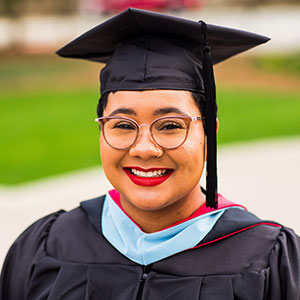
Erin Elliot will graduate on Saturday with a master’s degree in educational psychology. She has been a staff member Multicultural Student Affairs, a frequent collaborator with all of NC State’s Campus Community Centers and a regular contributor to the Diversity Digest.
 As an incoming graduate student to NC State, I didn’t know anyone on campus. I was excited to be in a new environment but apprehensive about finding a community at such a large university. Over the course of my short tenure at State, I have been privileged to serve on committees, take courses in other disciplines, create new programs and make life-long connections. These opportunities have contributed to my identity as a scholar and provided me with the tools to understand that my lens isn’t uniform or traditional but rather consists of many distinct pieces.
As an incoming graduate student to NC State, I didn’t know anyone on campus. I was excited to be in a new environment but apprehensive about finding a community at such a large university. Over the course of my short tenure at State, I have been privileged to serve on committees, take courses in other disciplines, create new programs and make life-long connections. These opportunities have contributed to my identity as a scholar and provided me with the tools to understand that my lens isn’t uniform or traditional but rather consists of many distinct pieces.
I am truly grateful for my time at this institution and the community that I’ve found, but I would be remiss if I didn’t consider James Baldwin’s words at this moment. He says when we love something, we have the right to critique it; thus, this is a love letter for my future alma mater. It is because I have grown to love NC State and hold it near to my heart that “…I insist on the right to criticize her perpetually.” I have done this in prior contributions the Diversity Digest and The Nubian Message; nevertheless, I decided to leave one last note for good measure. To that end, I think it is appropriate to discuss three main areas: 1) serving students, 2) increasing diversity and 3) acting with intentionality.
- Serving Students
When the university was founded, it served White men. Women and Folk of Color were not granted admittance until years later, yet served as the backbone from the very opening of NC State’s doors. If we remind ourselves of the historical context our university is situated in, centering the students that occupy the space becomes less of an afterthought and more of a necessity. Students are why we are here. We are why the university exists. We can’t continue to make decisions that affect the livelihood of students on campus without incorporating them in decision-making processes. That is not equitable, and it is far from inclusion. In order to work towards a healthy campus climate for all students, we have to — at minimum — create more seats at the table for students with diverse thought, listen to their concerns and suggestions and then help them to fix the problem. We can’t serve students without their voices in the equation. Otherwise we might as well be a dictatorship.
- Increasing Diversity
Leading the pack involves more than just being the best at the moment, and shouldn’t be reduced to placeholders and rankings. We need to take this into consideration when examining our strides toward diversity and inclusion. Some may argue that we are doing good work, but good isn’t great and great could always be better. True leadership requires continuous effort to be better even when you are only in competition with yourself. That is what leading the pack means. How can we continue to apply the pressure on ourselves, as an institution, to ensure we are doing right by our current and future students? My vision would be to send out regular assessments on climate that are reviewed and shared with the university community at large. Moving the needle on inclusion efforts requires transparency. We can only get better if we know what we are working with. If we are all clear on where our foundation is, we can begin to build on it.
- Acting With Intentionality
“Think and Do,” will be a motto I carry with me both in and out of the classroom. I am a firm believer that our thoughts should be spoken into fruition; however, I don’t believe the saying stops here. We should ask our students, faculty and staff to “Think and Do” and charge them with the responsibility to do so with intentionality. When all is said and done, how are we challenging ourselves to show up today for the legacy we are leaving for tomorrow? I think Solange answers this well by saying we should “do nothing without intention.” When we begin to piece together our individual building blocks, the final structure becomes clearer; it is our collective responsibility to contribute to the betterment and longevity of this institution. Every piece and every body matters to that mission.
Overall, my experience at NC State has been amazing, but I recognize that doesn’t remove my responsibility to critique my interaction with it. Love is a uniquely complex thing and when we are open to it, areas for growth naturally present themselves. If we push ourselves and our university community to reflect on the way we value our students, include diverse perspectives in our decision making and do so with intentionality, I believe NC State will lead the pack for many years to come.
Erin Elliot will attend the University of Michigan next fall to begin working on her Ph.D.